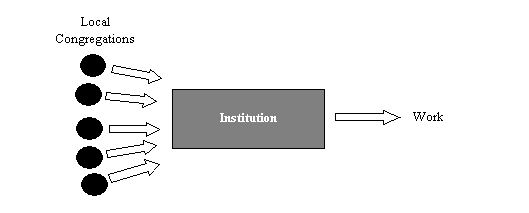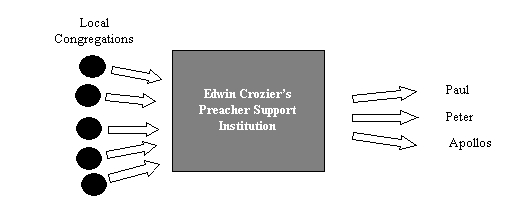|
Introduction:
On the second Sunday night of each month, we set aside time to
answer questions that have been pre-submitted. If you have any
questions you would like dealt with, please pick up one of the
forms from the table in the foyer, fill it out and drop it in the
appropriate box outside of my office. During this lesson, we will
deal with one question: “What do we mean when we call ourselves
a non-institutional church?"
Discussion: I.
The nature of the church. A.
To fully understand why we call ourselves a
non-institutional church, we need to remind ourselves of the
nature of Christ’s church. The term church is used in two
similar but distinct ways. In Matthew
16:18, Jesus spoke of the church He was going to build. In
that passage, He spoke of the church universal, that is, the body
of believers in Christ for all times and in all places. However,
in passages like I
Corinthians 1:2, Paul wrote to the “church of God which
is at Corinth.” He was writing to a local group of people who
banded together assembling regularly under a common oversight,
using a common treasury, performing a common work. Thus we find
the universal church and the local church in Scripture. B.
We remember that the universal church is the universal body
of all the saved individuals, not a universal body of all the
local churches. In fact, we do not find any kind of organization
in which local churches banded together to form associations,
organizations or denominations. Instead we find local
congregations who were autonomous, that is, self-governed, as
demonstrated by I
Peter 5:2; Acts 14:23. Because we believe a local
congregation should be autonomous and self-governing we are not
linked in any organizational way with any other congregation. C.
It is reasonable to believe, that even though we are
autonomous from any other group and that there are numerous groups
that hold this same pattern of autonomy, if we are all using the
same standard, we will all look relatively the same. We will
worship the same way. We will work the same way. We will organize
the same way. We will teach the same doctrines. That is exactly
how it works so long as each congregation uses the same standard
and uses it the same way. That is where the problem lies. While
most churches claim to use the Bible as their standard, each one
does not use it the same way. Because of that, differences have
arisen between churches, even between churches that teach the same
gospel message. One of those differences has been labeled
“Institutionalism.” II.
What is institutionalism? A.
Webster’s defines an institution as “an organization,
establishment, foundation, society, or the like, devoted to the
promotion of a particular object, esp. one of a public,
educational, or charitable character.” According to that
definition, guess what the local church is. It is an institution.
It is a body which Christ has established to accomplish His work
in this world. B.
The purpose of the church is to hold up the truth (I
Timothy 3:15). As we have seen, the government of the
local church is a group of elders (I
Peter 5:2; Acts 14:23). These are men who have met various
qualifications (I
Timothy 3:2-7; Titus 1:5-9) appointed as overseers,
pastors or bishops within the congregation. Their job is to
shepherd the flock of God among them. They are not given authority
beyond the borders of the local flock. Further, they are not given
permission to pass the church’s work off to any other group. C.
Institutionalism is the establishment of other institutions
supported by a church or churches to accomplish work.
Institutionalism, we might say, is the instituting of a middle-man
organization between the local congregation and the work the
congregation is accomplishing as demonstrated in the following
chart:
D.
Typically the purpose behind setting up such an institution
is the claim that one local church cannot possibly do all the work
that is needed. Therefore, we will set up an institution that can
solicit resources from multiple congregations to accomplish the
work. It looks like the following.
III.
What is the problem with institutionalism? A.
What is not the problem with institutionalism? 1.
First, the problem is not that an institution was
established to do some work that the church is authorized to do.
The church is authorized to teach the Bible. So are you. If you
want to teach the Bible separate from the congregation’s
direction, you are free to do so. If you want to organize an
institution that produces and distributes materials, you are free
to do so. If you want to gather together a group of teachers,
develop some administrative staff, charge tuition and set up some
institution that does nothing but teach the Bible, feel free to do
so. As an individual Christian you are allowed to teach the Bible
just as the church is. 2.
Second, the problem is not whether or not there is
authority for the local church to perform the work that the
institution is performing. Certainly, the church should not do any work which is not
authorized by scripture whether through a middle-man organization
or otherwise. But even if the work is authorized for the church
that is not the issue here. B.
The issue is that God never authorized manmade middle-man
institutions. God instituted local congregations to accomplish His
work. The elders of a congregation are to oversee the work. They
are not to set up some board or organization separate from the
church to oversee the work or determine how the church’s funds
are going to be used in any aspect of the work. C.
For instance, I like preachers. I want to support
preachers. I want to do more than support preachers, I want to
encourage all kinds of other people to support preachers. So I set
up my non-profit 501(c)(3) organization and start motivating
people to give to me to support preachers. Then it occurs to me, I
can actually tap into groups of people, instead of one individual
at a time, by getting churches to contribute money to my Preacher
Support Institution. The chart below demonstrates what that looks
like.
Notice
what is happening in this situation. The elders of these local
congregations want to do the important and authorized work of
supporting preachers. But instead of just doing the work, they
send my institution the money and I decide how the money is going
to be spent and which preachers are going to be supported. This
all sounds good until we start looking for scriptural support for
this kind of organization. D.
Consider Romans
15:24; II Corinthians 11:8; Philippians 4:15-16. All of
these passages talk about churches supporting evangelists. Philippians
1:5 called it participating in the gospel. But it
doesn’t look like the institutionalism chart. Rather it looks
like the following:
Looks
very different doesn’t it. It is a great thing when churches
want to support preachers. If they want to do that, they need to
simply support the preachers. God has never authorized a
middle-man organization to solicit funds from churches and support
preachers. E.
Consider another example. Marita has a heart for her
brethren. She always wants to help her brethren, especially the
ones in need. She loves to provide monetary assistance to brethren
in need. Further she likes to help accomplish jobs for people who
cannot work easily anymore. So she trains Tessa to clean houses
for the widows and trains Ethan and Ryan to cut their grass. Then
it occurs to her that she could do some really good work if she
got organized and made it bigger. She starts talking to her
friends and they start contributing. She starts the Marita
Crozier’s Needy Christian Relief Institution. She hires more
cleaners, grass cutters and handymen. She starts sending out funds
to Christians in need, especially widows. Then one day she
realizes, she could really bring in the funds if she started
hitting up churches, groups of people, instead of just
individuals. The chart below demonstrates what this look likes.
Notice
what is happening in this situation. The elders in these
congregations want to do the important work of helping out
Christians in need. Instead of just doing the work, they send the
money to an institution and let the institution do the work. This
all sounds good until we go to the scripture to find authority for
this kind of organizational setup. F.
Consider Acts
11:27-30; I Corinthians 16:1-4; II Corinthians 8:1-14; I Timothy
5:3-10. All of these passages talk about churches
providing relief to brethren in need. But it doesn’t look like
the institutionalism chart. It looks like the following:
Looks
very different doesn’t it. Some will suggest that sending the
gifts via Paul and his companions provides the authority for the
middle-man benevolent institutions. However, that argumentation
falls far short. Paul and his companions were not an institution
that solicited funds from a church and then did the work of
relieving needy saints. Paul was the messenger, the mail man. Even
if you establish an institution, somehow the funds have to get
from the churches to the institution and then from the institution
to the people who need the relief. Without an institution, the
funds must somehow get from the churches to the needy brethren.
That is all Paul did. It is a great thing when churches want to
provide relief to needy brethren. If they want to do that, they
need to simply relieve needy saints. God has never authorized the
use of middle-man organizations to provide relief to needy saints. IV.
Why are we called a non-institutional church? A.
We are called a non-institutional church because we refuse
to establish or fund middle-man institutions to accomplish the
work which God has given us as a local congregation. Because we
believe it is important to do God’s things God’s way, we will
only do what we can find authority for in scripture (II
Timothy 3:16-17). B.
Therefore, we uphold the truth, supporting it and
proclaiming it. We directly support evangelists both locally and
in foreign places as we have opportunity and resources to do so.
We directly provide relief to saints in need, locally and in other
locations. We do our work. We let other churches do their work.
But we refuse to hand the oversight of our funds and our work to
anyone else, whether another congregation or some other
institution. Conclusion: I hope this explanation provides insight into what we want to do at the Franklin Church of Christ. As with all of my sermons, I realize I might be wrong. If you think I have missed it somewhere, lets get together and talk about that, studying the Word together. If we simply use the Word as our guide, we will be doing what God wants. When we start adding in our own ideas is when we get in trouble.
Glory
to God in the church by Christ Jesus
|





